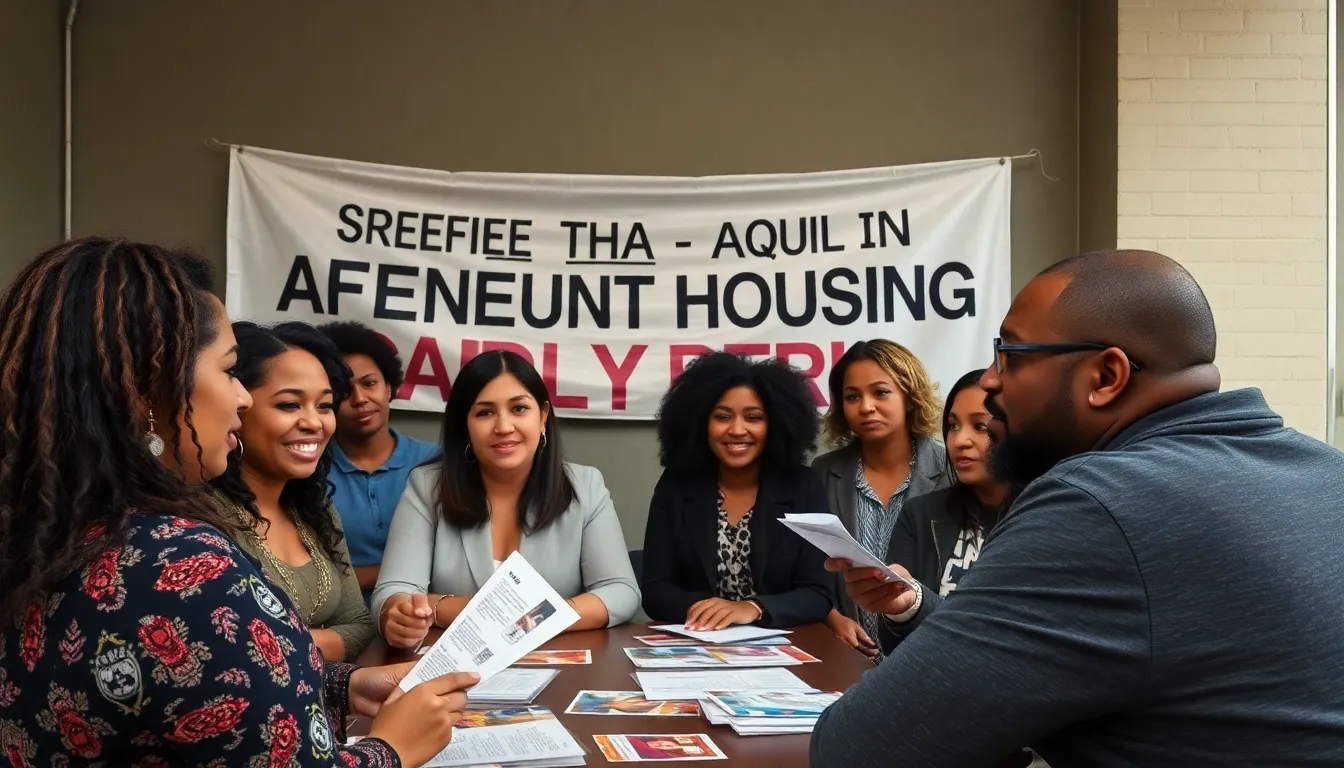In an ever-evolving housing landscape, tenant advocacy plays a crucial role in ensuring renters’ rights are upheld. As housing costs soar and rental markets become more competitive, many tenants find themselves navigating complex legal waters without adequate support. This advocacy movement empowers individuals and communities to stand up for their rights, fostering a more equitable living environment.
Organizations dedicated to tenant advocacy work tirelessly to educate renters about their rights, provide resources, and facilitate connections to legal assistance. By amplifying the voices of those often marginalized in housing discussions, tenant advocates strive to create lasting change. Understanding the significance of tenant advocacy can help renters feel more secure and informed in their housing journeys, ultimately leading to a stronger community.
Table of Contents
ToggleOverview of Tenant Advocacy
Tenant advocacy focuses on educating renters about their rights and providing support in navigating housing challenges. Organizations dedicated to tenant advocacy work tirelessly to inform individuals about local laws, fair housing practices, and tenant rights. These resources empower tenants to assert their rights and address unfair rental practices.
Key components of tenant advocacy include:
- Education Programs: Workshops and seminars help tenants understand leases, eviction processes, and housing regulations. Participants learn how to effectively communicate with landlords and navigate disputes.
- Legal Assistance: Access to legal aid services is crucial. Many organizations connect tenants with attorneys who specialize in housing law, ensuring adequate representation in disputes.
- Resource Distribution: Tenant advocates provide essential resources, such as pamphlets and guides, detailing tenant rights and housing options. This information often assists individuals facing eviction or discrimination.
- Community Advocacy: Tenant advocacy groups engage in lobbying efforts for policy changes that protect renters’ rights and promote affordable housing initiatives. These efforts contribute significantly to influencing housing legislation.
- Support Networks: Establishing networks among tenants fosters a community of support. This network encourages renters to share experiences and challenges, strengthening collective voices in negotiations with landlords.
Tenant advocacy plays a vital role in enhancing the overall living conditions for renters. By addressing systemic issues and providing necessary tools, advocates contribute to a more equitable and just housing environment.
Importance of Tenant Advocacy


Tenant advocacy plays a crucial role in safeguarding the rights of renters while fostering a more equitable housing landscape. By providing information and resources, tenant advocacy empowers individuals to navigate their housing situations effectively.
Legal Rights of Tenants
Understanding legal rights is essential for tenants facing issues with landlords. Tenant advocacy organizations inform renters about laws regarding leases, security deposits, eviction procedures, and habitability standards. They ensure tenants know their rights under federal, state, and local tenant laws. Moreover, these organizations connect renters with legal assistance when disputes arise, helping them defend against wrongful evictions or unfair practices. This legal support not only protects individual tenants but also reinforces broader tenant rights across various communities.
Impact on Housing Stability
Tenant advocacy significantly contributes to housing stability within communities. By educating renters about their rights and providing access to necessary resources, advocacy groups help prevent homelessness and displacement. When tenants are informed, they’re more likely to assert their rights, negotiate fair terms, and maintain stable living conditions. Furthermore, advocacy organizations engage in policy efforts, pushing for affordable housing initiatives and stronger tenant protections. These actions collectively enhance community resilience, ensuring that vulnerable populations access safe and affordable housing options.
Key Organizations Involved in Tenant Advocacy
Various organizations play vital roles in tenant advocacy, offering resources, legal support, and policy initiatives to protect renters’ rights. These organizations operate on both national and local levels, addressing tenant issues comprehensively.
National Groups
- National Alliance of HUD Tenants (NAHT)
NAHT focuses on the rights of tenants living in properties financed by the U.S. Department of Housing and Urban Development. It provides tenants with education on their rights and advocates for affordable housing policies.
- National Low Income Housing Coalition (NLIHC)
NLIHC is dedicated to advocating for policies that ensure affordable housing access for low-income families. It conducts research, disseminates information, and mobilizes grassroots support for housing initiatives.
- American Civil Liberties Union (ACLU)
The ACLU addresses tenant rights as part of its broader mission to defend civil liberties. It works to protect renters from discrimination and advocates for fair housing practices.
- Tenant Rights Groups
Various tenant rights groups exist nationwide, such as the Tenants Union and the New York City Tenant Advocacy Coalition. These organizations offer support, resources, and legal assistance while campaigning for tenant-friendly policies.
Local Initiatives
- Citywide Tenant Organizations
Many cities host tenant organizations that provide direct assistance and resources to local renters. Examples include the Los Angeles Tenants Union and the San Francisco Tenants Union, which educate tenants on their rights and facilitate community organizing.
- Housing Justice Campaigns
Local initiatives often launch campaigns aimed at specific housing policies. These campaigns unite community members to advocate for rent control, eviction protections, and affordable housing development.
- Legal Aid Societies
Numerous cities feature legal aid societies that specialize in housing law. These organizations provide free legal representation to tenants facing eviction or landlord disputes, ensuring that renters receive fair treatment under the law.
- Neighborhood-Based Advocacy Groups
Local advocacy groups focus on specific neighborhoods, addressing unique housing challenges. They collaborate with tenants to advocate for improvements in housing conditions, zoning changes, and fair rental practices.
Challenges Faced in Tenant Advocacy
Tenant advocacy faces numerous obstacles that hinder its effectiveness. These challenges include legal barriers and social stigmas affecting renters’ ability to assert their rights.
Legal Barriers
Legal barriers pose significant challenges to tenant advocacy efforts. Many rental agreements contain complex legal jargon that confuses tenants, making it difficult for them to understand their rights. Access to affordable legal counsel remains limited for low-income renters, forcing them to navigate eviction processes and disputes without appropriate representation. Additionally, specific state laws may favor landlords, complicating tenants’ ability to advocate for fair treatment. Limited awareness of tenant rights among renters results in underreporting of issues like illegal evictions and unsafe living conditions. Advocacy organizations strive to address these barriers by providing educational workshops and resources to demystify legal processes.
Social Stigmas
Social stigmas surrounding renting contribute to the challenges faced in tenant advocacy. Many individuals perceive renters as less stable or responsible than homeowners, leading to discrimination and unfair treatment in housing markets. This stigma deters tenants from voicing concerns about unfair practices or substandard conditions for fear of retaliation from landlords. Furthermore, marginalized groups, including low-income families and minorities, often experience heightened discrimination, which exacerbates the barriers to housing stability. Advocacy initiatives aim to change public perceptions about renting by highlighting the value and contributions of renters to communities. These social shifts play a crucial role in empowering tenants and fostering a more equitable housing landscape.



